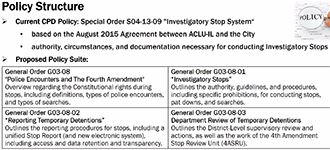At a recent court hearing, police reform advocates had strong critiques of "investigatory stop" reforms proposed by the Chicago Police Department (CPD).
The discord came during a Nov. 12 federal court hearing about the status of CPD's compliance with a 2019 Consent Decree that imposes wide-ranging reforms.
In August of 2017, the state's attorney general and a coalition of community groups ("the Coalition") sued the city of Chicago in federal court to compel CPD to address findings by the U.S. Dept. of Justice that CPD had engaged in a longstanding, pervasive "pattern or practice" of civil rights abuses. That suit resulted in the 2019 Consent Decree, which mandates hundreds of reforms that CPD must implement—under supervision of a federal judge.
The Nov. 12 hearing, held via videoconference, was presided over by Rebecca Pallmeyer, a judge of the U.S. District Court, Northern District of Illinois.
In the hearing, CPD staff presented a "Proposed Policy Suite" that would reform the ways that officers conduct investigatory stops and searches of individuals.

Part of Chicago Police Dept.'s presentation at Nov. 12 hearing.
Source: U.S. District Court, Northern District of Ill.
The policy suite faced criticism by some of the lawsuit's plaintiffs. One was Coalition member Sheila Bedi, a professor with the Northwestern Pritzker School of Law.
"The existence of these policies," Bedi said, "and the hostility that they demonstrate to community violence interruption [CVI] work is certainly going to chill the successful violence interruption work that we've seen in the streets of the city of Chicago—particularly as it relates to young people."
CPD Superintendent Larry Snelling pushed back.
"We work directly with our CVI workers," Snelling said. "We work in partnership with them—and when we come up with strategies we share those strategies with our CVI workers.
"We're actually working on something right now where we're sharing alerts and [video release] notifications to those workers—so that they know when something occurs in the neighborhood, they can kinda get out in front of it, help us out, to avoid retaliation."
An audio recording of Bedi and Snelling follows.
Premium audio (requires Cloutmeister or higher subscription):
Available only to subscribers. Subscribe here for unlimited access. Subscribers: log in.
Audio transcript (requires Superintendent or higher subscription):
Available only to subscribers. Subscribe here for unlimited access. Subscribers: log in.






